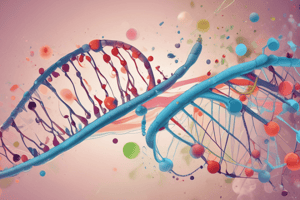Podcast
Questions and Answers
What are two techniques that allow researchers to make precise modifications to DNA sequences?
What are two techniques that allow researchers to make precise modifications to DNA sequences?
How does genetics contribute to the field of medicine?
How does genetics contribute to the field of medicine?
What is a key section in a genetics research paper that interprets the results in light of the research question?
What is a key section in a genetics research paper that interprets the results in light of the research question?
Which section of a genetics research paper should detail the experimental procedures?
Which section of a genetics research paper should detail the experimental procedures?
Signup and view all the answers
What does genetics promise to contribute to as we continue to decipher the genetic code?
What does genetics promise to contribute to as we continue to decipher the genetic code?
Signup and view all the answers
Study Notes
Unraveling Genetics: Exploring Biology's Building Blocks
Genetics, the scientific study of heredity and variation, sheds light on the mechanisms through which living organisms transmit traits from one generation to the next. This intriguing discipline combines laboratory techniques, mathematical models, and theoretical explanations to reveal the complex tapestry of life.
The Building Blocks of Genetics
At the heart of genetics lies the DNA molecule, a unique chemical code that carries the blueprint for life. A DNA molecule, consisting of nucleotides organized in a double helix, is the genetic material of an organism. Each segment of DNA, called a gene, provides instructions for assembling proteins and regulating the processes of life.
The Science of Gene Expression
Gene expression, the process where DNA is converted into functional RNA molecules, culminates in the synthesis of proteins. The process is regulated by various molecular mechanisms, such as transcription factors and epigenetic modifications. Understanding these processes allows scientists to decipher the information stored in the genetic code and its influence on biological phenomena.
DNA Manipulation
As the field of genetics has advanced, so have the techniques for manipulating DNA. Techniques such as PCR (polymerase chain reaction) and CRISPR (clustered regularly interspaced short palindromic repeats) allow researchers to make precise modifications to DNA sequences, providing powerful tools for understanding and manipulating heredity.
The Role of Genetics in Biology
Genetics serves as a cornerstone for biology, with its principles shaping our understanding of diverse fields, including ecology, evolution, and medicine. For instance, understanding the genetic basis of diseases allows for more targeted and effective treatments.
The Genetics Journey
Writing a genetics research paper requires a clear structure, with sections such as the abstract, introduction, methods, results, discussion, and conclusion. The introduction should introduce the research question and its relevance, while the methods section should detail the experimental procedures. Results should be presented in a clear and concise manner, with figures, tables, and text. The discussion section should interpret the results in light of the research question, and address the limitations and future research directions.
In summary, genetics is a fascinating area of biology, providing insights into the structure and function of living organisms. As we continue to decipher the complexities of the genetic code, the field promises to contribute to a deeper understanding of life, revealing the intricate interplay between genes and their expression in our world.
Studying That Suits You
Use AI to generate personalized quizzes and flashcards to suit your learning preferences.
Description
Test your knowledge on genetics, the intricate study of heredity and variation, and explore how DNA, genes, and gene expression contribute to the foundation of life. Learn about techniques like PCR and CRISPR used in DNA manipulation, and understand the vital role genetics plays in various biological fields.




